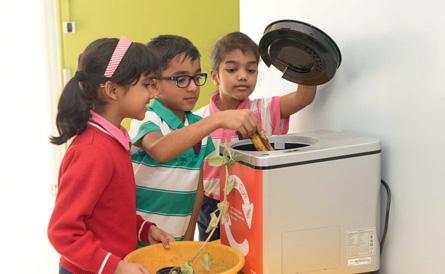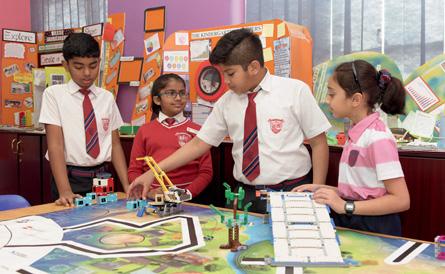
7 minute read
UN-certified Climate Change Principal
Climate Change Principal
Principal of The Kindergarten Starters, Asha Alexander shares her inspiring initiatives in climate change literacy
Advertisement
Asha Alexander says she didn’t see it all coming, but when you speak to her, it quickly becomes clear why she has made a global impact in the area of environmental education and climate change teaching in such a short time. Principal of The Kindergarten Starters since 2011, Asha has recently brought her school to the attention of not only world media outlets but also the United Nations, international ministers and NGO representatives. We visited her school to find out more.
Clockwise: Asha Alexander in front of her school; using robotics and AI to solve climate-related problems; students place fruit peels in a compost machine; tree planting for the Plant A Legacy global initiative



Tell us about your career? I’ve been a teacher for 33 years. My last posting in India as a teacher was in Mumbai, before GEMS Education Founder and Chairman Sunny Varkey recruited me in 2001. I moved to Dubai to teach at GEMS Modern Academy, and at that stage I thought I would remain in Dubai only briefly, but my twins took to it very well and I decided to stay. I stayed at GEMS Modern Academy for six years as Head of Primary. I then left GEMS Education briefly to work at another school, before enrolling for a Master’s in Educational Leadership at Walden University in the US and then returning to GEMS in 2011 as Headmistress at The Kindergarten Starters. I took over as Principal in 2012. This is home for me now.
Why did you decide to become a teacher? I wasn’t meant to be a teacher! I liked art and painting among several other things. However, education has allowed me to continue to do everything I am interested in – philanthropy, sustainability, counselling and art.
What drew you towards climate change? Six years ago, the school applied for a Green Flag as we had been involved in the UAE Eco-Schools programme. But these actions were activity-based – doing beach cleanups, for example, and I wanted to integrate climate literacy more in the classroom. In 2017, there was terrible flooding in Kerala. Fourteen districts were flooded, leaving many children and parents from our school stranded and without food. I just missed being stranded myself. Our immediate reaction was to send tonnes of relief material to Kerala via the Red Crescent. The following year, there was more flooding and one of our GEMS ancillary staff members lost his life trying to save his son. This was unprecedented in my life. I am 58 years old. So this year, I wondered what we should do. I saw an article in the Khaleej Times about a UN-certified climate change course. I discovered that I was the first head teacher in the UAE to do this course. It took 25-30 hours and I found it very useful, so I passed it onto my staff. It was a holiday at the time, but within two weeks I saw that almost 60 teachers had completed the course. I phoned EduCCate Global [see box overleaf] and told them that my target was to have all of our teachers accredited. Two weeks later, we had 200 teachers accredited. And then something strange happened: our admin, front-of-house and accounts staff completed the course. Everyone did it – 327 staff and even 68 parents!
That’s amazing. What did you do next? I contacted EduCCate Global and they thought this was phenomenal. I felt that we had to do something with this achievement, as there was no point in earning the distinction alone. I wanted to map the curriculum with the objectives of climate change literacy and integrate it into every subject block. Our teachers and I were able to introduce

Principal Asha Alexander reading stories on climate change with Kindergarteners
elements of climate change literacy to Maths, Moral Education, English and more so that students visit those topics regularly and the messages are consistent. The teachers found space for it and it did not weigh the curriculum down.
What was the reaction of the representatives at the UN? Angus Mackay is a Director at the United Nations Institute for Training and Research (UNITAR), and he said that my greatest singular achievement was getting every staff member to complete the course. He said that represented a culture of learning that permeates our whole school and that culture carries outside the classroom and into the campus so that even parents are involved. He told me that was real leadership. He was very impressed. Education ministers and leaders of other countries now want to visit our school to see how we have integrated climate change teaching into our curriculum.
How did you become the first school principal in the world to speak at a UN climate conference? I was invited by UNITAR and EduCCate Global to talk at COP25 in Madrid last December. There, I met Al Gore and world leaders from Jordan, Canada, India, Nigeria and NGOs. I spoke for 45 minutes at the UNITAR side event about how we mapped out our curriculum and embedded climate change literacy. I demonstrated how lessons are conducted and the curriculum is mapped with videos and photos. The World Green Economy Organization (WGEO) based in the UAE is keen to embed this curriculum in all schools across the region. They have the remit to spread this across the world. I heard Greta Thunberg speak, and she has a powerful voice. But personally, I believe children should be in school learning about climate change in the classroom. It’s about education. That’s where the difference is made.
What does it mean for you to attend these events? I didn’t realise the impact of what I was doing, but once the UN is involved, doors open for you as it’s a respected entity around the world. It’s a powerful position to be in.
What is the next step for you and your school? What I learned from speaking at COP25 is that you have to be a good communicator. If you are speaking at a live conference, you’re representing your country and you have to be diplomatic, articulate and careful with your words. Children have to learn that. If you give children a platform, they can share ideas and, in that way, create a culture of learning. I want to teach civil discourse so that children know how to defend their point of view. I would like to establish a student body in the UAE. Also, I have been asked to present at COP26 next year in Glasgow. There, I want to present figures to show how we have been able to reduce our carbon footprint. If I can share what we’ve done so that other schools can integrate that into their curriculum, then we have made a real change.
How are you inspiring the next generation? By creating platforms and offering them opportunities to find their voice and express their ideas. Students need role models. They need to see how adults can pave a path in uncharted territories by being courageous and taking risks.
How are you inspiring other educators? Inspiration is drawn when you become an example through the integrity of thought and action that you demonstrate. You must be true to yourself for others to be inspired.
What does this mean for GEMS Education? I hope other schools will embrace climate literacy. If every school embraces it with the same fervour as we have, it will help to clearly place GEMS Education as a leader in climate literacy.
What is eduCCate Global?
eduCCate Global is a joint partnership with the United Nations Institute for Training and Research (UNITAR) to develop and deliver climate change education programmes and UN-recognised climate change teachers for every school in the world.
How does it work?
The eduCCate Global climate change education programme integrates a number of key learning and curriculum components to ensure that lead teaching staff can deliver timely and professional environmental cross-curricular material to their students. Rather than forcing timetable changes, an integrated cross-curricular approach is encouraged, which emphasises placing climate knowledge inside the subject matter in an engaging way.











